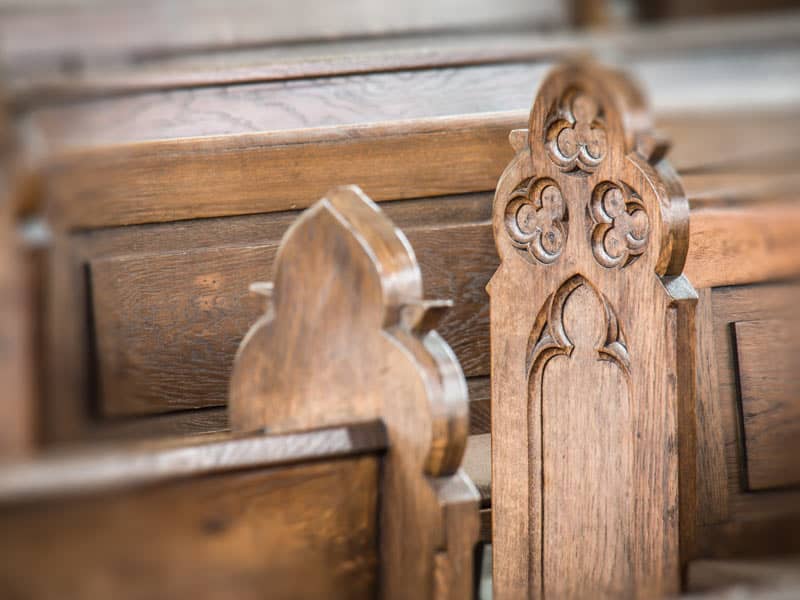Other recent national dramas--say, the O.J. Simpson trial and the Monica Lewinsky affair--aroused Americans, but none has touched their moral and political nerves quite like this. The presidential election is not just an election procedure--it is a ritual that, like all rituals, affirms shared views and convictions about our social order.
In this instance, we're affirming a set of values, symbols, and sentiments that, taken together, make up what is sometimes called the nation's "civil religion." This is an Americanized belief system that includes sacred texts such as the Bill of Rights and the Constitution, sacred places such as Arlington Cemetery, sacred symbols such as the American flag, and sacred rituals such as Memorial Day celebrations and presidential elections. Crucial to this belief system is the deeply-felt notion that Americans are a "chosen people," divinely endowed with a special purpose to embody principles of justice and fairness and to defend the democratic way of life--to be as the early Puritans said, a "city set on a hill."
Since it is a national faith, Americans of all religious traditions are united in a common understanding of themselves and of America and its destiny. That is why god-talk is common around election time. This election generated a lot of it, primarily because Joseph Lieberman was the first Jewish candidate on a national ticket. But such talk is not all that unusual in national elections. In the 1950s, there was Eisenhower's talk about faith and its importance. There were the issues surrounding Kennedy's Catholicism in 1960, and of course the "born-again Christian" politics beginning with Carter in 1976 and its even greater embrace of Reagan in 1980.
But what happens when a major ritual--a presidential election--breaks down? In both religion and politics, uncertainty breeds worry and often urgent appeals for divine intervention. And in this instance--where religion and politics fuse around civil order--those worries and appeals have mushroomed.
We find plenty of civil religious symbols popping up since Election Day. Some say we are in a "waiting period" (wandering in the "wilderness"?), when God's will is being worked out, and that ours is a time of "struggle" (a time of "testing"?) for the nation. Television broadcasts and websites suggest that fundamentalist and evangelical Christians see the nation in a "desperate situation," on the brink of "warfare," if not the apocalypse. Some pastors and religious leaders call upon people to pray that God's man will be elected. Placards and signs carried by people in the streets ask that we be "delivered" from our plight and that "God help us."
Other voices call for prayers for the nation, asking for that which is in its best interests and for an honest expression of the will of the people. They look for a resolution of this crisis, but not by recourse to partisan politics or jingoistic god-talk. Theirs is a profound religious hope that the nation will do what is right and then, once the dust settles, will come together as a people around its highest ideals and principles.
In all of this, Americans are being jarred into some foundational thinking about themselves. Can we envision a larger, transcendent purpose for the nation? Can we rise above our partisan political and religious views to discern the "God of the nation"? Admittedly, these are big questions, but there are signs of reflection in many quarters. Some people who did not vote in this election are saying they wish they had, not just out of loyalty to Bush or Gore, or that it might have made the outcome more decisive, but because it is their duty to vote. "Duty-talk" is bound up with "god-talk" in civil religion.
The concern with tightening election procedures and improving ballots is more than just pragmatic. Once beyond the vote count in this particular election, all Americans--Democrats, Republicans, and Independents--will say we need an efficient and reliable way of counting ballots. Lying behind the ballot is a belief in the American Way.
And then there are the children, who are getting a good lesson in civics. Schools may be under pressure to steer clear of religious beliefs and values in the classroom, but civil religion can't so easily be contained. There is talk about democracy and the importance of voting, and even more specifically, about how Americans understand their participation in the political process. In this atmosphere, children will draw their own conclusions about God and country.
Writing 35 years ago, sociologist Robert Bellah warned about a civil religion that can be easily used as a "cloak for petty interests and ugly passions." But he also argued that this is a "heritage of moral and religious experience from which we still have much to learn as we formulate the decisions that lie ahead." It is a heritage that has guided us through crises before, including the worst crisis of all, the Civil War, when Abraham Lincoln was led to reflect upon the country as "an almost chosen people."
It may take a crisis of the sort we are now experiencing to bring us to this deeper encounter once again. If so, then hopefully Florida's ordeal will lead not to rancor about the political outcome, but to the nation's resolve to honor its most cherished heritage, upon which the nation's unity and sense of purpose rests.

